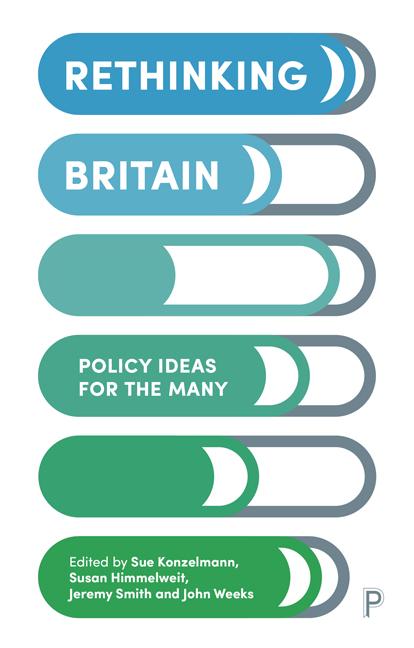Book contents
- Frontmatter
- Contents
- List of Tables and Figures
- The Contributors
- Foreword
- Introduction
- Interlude: ‘Mirror, Mirror, On the Wall – Who has the Highest Debt of All?’
- Part One Building a Full-Employment Economy: Introduction
- Part Two Public Investment – Prioritising Society Rather than Profit: Introduction
- Part Three Making Finance Work for Society: Introduction
- Part Four Genuine Social Security: Introduction
- Part Five How to provide for Social Needs: Introduction
- Conclusion
- Jargon Busters
- References and Further Reading
- Index
8 - How Can we Fix the Broken Energy Sector?
Published online by Cambridge University Press: 11 March 2021
- Frontmatter
- Contents
- List of Tables and Figures
- The Contributors
- Foreword
- Introduction
- Interlude: ‘Mirror, Mirror, On the Wall – Who has the Highest Debt of All?’
- Part One Building a Full-Employment Economy: Introduction
- Part Two Public Investment – Prioritising Society Rather than Profit: Introduction
- Part Three Making Finance Work for Society: Introduction
- Part Four Genuine Social Security: Introduction
- Part Five How to provide for Social Needs: Introduction
- Conclusion
- Jargon Busters
- References and Further Reading
- Index
Summary
What's the issue?
In theory, the privatisation and deregulation of the UK energy sector was supposed to result in lower prices, as well as a better service for users, as a result of increased competition. But from the very beginning in the 1990s, attempts to redesign the energy market to make it live up to is promises have met with varying degrees of failure.
Energy prices did indeed decline initially, but that was mostly down to falling gas prices. Prices soon went up again – a trend that continues today. During election campaigns since, both main political parties have referred to the energy market as ‘broken’, proposing various ideas about how to fix it. Since free markets are not supposed to need fixing, this was embarrassing news for those supporting them – especially as similar problems were all too clear in the housing and financial markets as well. The ‘Big Six’ energy companies have maintained their domination, but not their customer satisfaction levels.
Overall, the energy market has clearly failed: users have often been overcharged, and security of supply remains a problem. Clean and renewable energy has certainly grown, but this is because of government support, not as a result of competition. On the whole, it is therefore hardly surprising that opinion polls show that a large majority of the public support renationalisation.
What is the appropriate policy for reforming the UK energy sector?
Analysis
In its 2017 manifesto, the Labour Party promised to bring energy back under public control by means of a phased approach. However, the transition phase would present a number of challenges.
Some have suggested taking over some of the existing plant and supply systems of the Big Six companies, although, at least in the medium term, this would be problematic. The financial cost of renationalisation would be considerable, and in more than a few cases it would also involve buying out-of-date facilities. So, aside from considering which facilities might be bought – with water supply probably topping the list – thought should also be given to the possibility of investing in new facilities instead, ideally with the latest clean technology.
There is also a pressing need to expand capacity, especially base load supply, which supports the idea of more public sector investment. Expansion is necessary because of the scheduled retirement of major power stations over the next 10 years.
- Type
- Chapter
- Information
- Rethinking BritainPolicy Ideas for the Many, pp. 93 - 96Publisher: Bristol University PressPrint publication year: 2019



